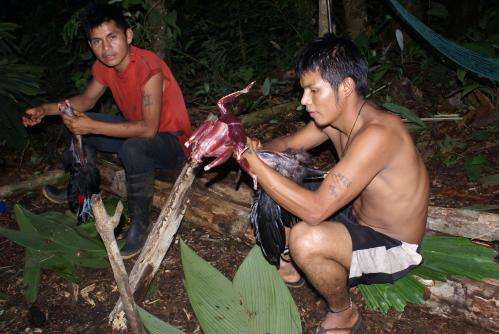Cost sensitive bushmeat hunters help out conservering hunted wildlife species

Hunting of bushmeat is one major cause of biodiversity loss in tropical countries. Research has shown that consumers of wildlife are price sensitive and that the quantity of meat purchased is influenced by the cost of bushmeat and its substitutes. Now also the behavior of the hunters has been studied.
There is evidence that hunter-gatherers are optimal foragers whose behaviour is influenced by costs associated with foraging, and therefore for example rising the costs of ammunition could potentially help conserving wild animals. However, there has been a paucity of studies on whether the behaviour of bushmeat hunters, like that of consumers, is cost sensitive moneywise.
In Ecuador, ammunition prices rose unexpectedly by 300 per cent in early 2009, because of a tax imposed by the national Government. This happened right when Anders Sirén, then postdoc researcher at the Pontificial Catholic University of Ecuador, and now lecturer at the Dept. of Geosciences and Geography at the University of Helsinki, Finland, was in the midst of conducting field research on the relation between wildlife hunting and habitat quality in Sarayaku, an indigenous community of above
1000 inhabitants in the tropical rainforests of Ecuadorian Amazonia
Anders Sirén soon realized that he could take advantage of this situation in order to empirically test the impacts of the ammunition cost rise on hunting behaviour. The results, which were published in the latest issue of the Oryx journal, in an article authored by him together with David Wilkie of the US-based conservation organization Widllife Conservation Society, show that hunters adapted to the new circumstances in several ways.
Taxing gunshots is an effective conservation measure for small animals
After the rise of ammunition costs, bush meat hunters spent less time hunting, and hunted fewer kilograms of meat. In particular, the hunting of small animals decreased, whereas hunting of animals large enough to be worth more than the cost of a shotgun cartridge even after the imposition of the tax, decreased much less.
Some hunters, however, instead switched hunting technology, from cartridge shotguns to muzzle-loaders, which are less effective but have much cheaper ammunition, and these hunters thus continued hunting also small animals.
In sum, taxing gunshots was a much more effective conservation measure for small animals than for large ones, and unfortunately the large animals are typically the ones that are most severely threatened by the impacts of hunting. According to the authors, in order to promote conservation also of large animals, much higher taxes on gunshots would be needed than the 300 per cent tax imposed in Ecuador.
The authors warn for the potential negative short-term socio-economic consequences that such high taxing of ammunition could have for hunting-dependent households in forest regions. The authors nevertheless conclude that taxing gunshots seems to be a useful tool for conserving hunted wildlife species, but is not sufficient alone, and should be used in combination with other measures.
Journal information: Oryx
Provided by University of Helsinki




















